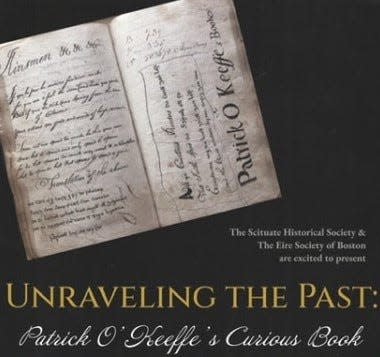Curious 200-year-old manuscript of Irish lore found in Scituate. What we know
SCITUATE − A mysterious, nearly forgotten booklet dating back to the early 19th century found in the archives of the Scituate Historical Society is drawing attention from scholars.
The 78 pages of English and Old Irish text, written by a single hand, contain a mix of traditional Irish folklore, legendary history and poetry, as well as a cobbler's trade notes, anecdotes and calendrical lore.
On Saturday, Nov. 4, Brian Frykenberg will give a talk about the rediscovered manuscript in Scituate. Frykenberg is director of the "Boston and the Irish Language Project" and a lecturer in modern Irish and Celtic languages at Edinburgh and Harvard universities. The free event is sponsored by Scituate Historical Society and the Eire Society of Boston.

Who was Patrick O'Keeffe and where was he from?
Details of the author's biography and how the manuscript got to Scituate remain unclear.
"That's part of the mystery," Frykenberg said.
The text, compiled between 1815 and 1855, appear to be the personal notes of a shoemaker named Patrick O'Keeffe. Place names in the booklet and the dialect of Irish point to the region of County Cork, Frykenberg said.
Did the author immigrate to Boston during the Great Famine?
Page 55 of the manuscript contains a brief but tantalizing entry: "Boston. February 20." Frykenberg said the reference, made at the height of the Great Famine, is accompanied by the Irish equivalent for "alas," an exclamation of woe.
One can only speculate what this means, Frykenberg said. Was the author reflecting on his disaster-stricken homeland after emigrating from County Cork to Boston? Or was he unable to leave Ireland but longing to join friends and family who had already escaped to brighter shores in America?
How did a shoemaker become highly versed in traditional Irish lore?
Bound in leather, perhaps left over from the cobbler's shop, with a single stitch down the middle, the booklet contains much that indicates its author was well educated in traditional Irish lore. Frykenberg mentioned a long poem recounting Irish history from mythological times to the reign of Oliver Cromwell.
There are transcriptions of several other poems by famous Irish poets, translated into English with notes in Old Irish and written in a fine calligraphy. The emphasis on traditional Irish language, history and religion suggests the author had "a very nationalist bent" and perhaps attended "hedge schools" in his youth, Frykenberg said.
Hedge schools flourished in Ireland from the late 17th to early 19th century when the Indigenous Irish population faced widespread discrimination under the Penal Laws, including prohibitions against setting up educational institutions. The hedge schools were clandestine, illegal schools offering instruction in Irish and Latin grammar as well as other forms of traditional knowledge "in an era when the language and the culture were proscribed," Frykenberg said.
A strong batch of poitín, a lively party and two weeks of penance
Other entries in the booklet are not so learned, including the mention of an upcoming feast day coupled with a recipe for poitín, also known as "Irish moonshine," a strong distilled beverage whose alcohol content can reach as high as 90%.
"(The author) even mentions at one point, and we don't know who it refers to, that someone is supposed to go through penance for two weeks ... and say so many rosaries," Frykenberg said. "It led me to wonder what happened at the party."
How the manuscript was rediscovered, and how it will be preserved and made public
Scituate Historical Society archivist Mary Porter said the mysterious booklet reemerged two years ago when a professor from a university in Limerick, Ireland, Eilís Lyons, called to inquire about the manuscript. With the help of the historical society's former archivist, Porter soon located the artifact.
"I was completely fascinated," she told The Patriot Ledger. She described the manuscript as a "commonplace book," which isn't quite a journal or a diary but a gathering of materials important to the person who compiled them.
With funding through the Community Preservation Act, Porter enlisted Frykenberg to study and translate the manuscript and had it sent to the Northeast Document Conservation Center in Andover.
The booklet has been fully digitized, Porter said, and within a month it will be made available to anyone around the world to view online through the historical society's website, where viewers will be able to zoom in and see its contents in fine detail. The "digital flipbook" will be accompanied by a running commentary to guide readers through the text.
Frykenberg said the artifact is a "South Shore treasure" that will attract scholars as well as the historically inclined lay person to Scituate for generations to come.
"The fact that the book has been preserved and will be made public digitally and will be onsite ... speaks very well of how to take care of a manuscript at a local level," Frykenberg said.
Live music and light refreshments before the talk. How you can register
The talk is scheduled for 3 to 5 p.m. Saturday at the Grand Army Hall at 353 Country Way in Scituate. Declan Houton will perform traditional Irish music, and light refreshments including beer and wine will be available. Register for the event online at tinyurl.com/irishartifact. The event is free with a suggested donation of $15.
Thanks to our subscribers, who help make this coverage possible. If you are not a subscriber, please consider supporting quality local journalism with a Patriot Ledger subscription. Here is our latest offer.
This article originally appeared on The Patriot Ledger: A 19th-century booklet in Old Irish and English resurfaces in Scituate
